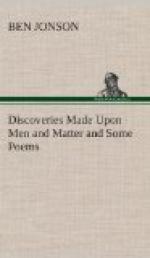Cognit. univers.—In being able to counsel others, a man must be furnished with a universal store in himself, to the knowledge of all nature—that is, the matter and seed-plot: there are the seats of all argument and invention. But especially you must be cunning in the nature of man: there is the variety of things which are as the elements and letters, which his art and wisdom must rank and order to the present occasion. For we see not all letters in single words, nor all places in particular discourses. That cause seldom happens wherein a man will use all arguments.
Consiliarii adjunct. Probitas, Sapientia.—The two chief things that give a man reputation in counsel are the opinion of his honesty and the opinion of his wisdom: the authority of those two will persuade when the same counsels uttered by other persons less qualified are of no efficacy or working.
Vita recta.—Wisdom without honesty is mere craft and cozenage. And therefore the reputation of honesty must first be gotten, which cannot be but by living well. A good life is a main argument.
Obsequentia.—Humanitas.—Solicitudo.—Next a good life, to beget love in the persons we counsel, by dissembling our knowledge of ability in ourselves, and avoiding all suspicion of arrogance, ascribing all to their instruction, as an ambassador to his master, or a subject to his sovereign; seasoning all with humanity and sweetness, only expressing care and solicitude. And not to counsel rashly, or on the sudden, but with advice and meditation. (Dat nox consilium. {17a}) For many foolish things fall from wise men, if they speak in haste or be extemporal. It therefore behoves the giver of counsel to be circumspect; especially to beware of those with whom he is not thoroughly acquainted, lest any spice of rashness, folly, or self-love appear, which will be marked by new persons and men of experience in affairs.
Modestia.—Parrhesia.—And to the prince, or his superior, to behave himself modestly and with respect. Yet free from flattery or empire. Not with insolence or precept; but as the prince were already furnished with the parts he should have, especially in affairs of state. For in other things they will more easily suffer themselves to be taught or reprehended: they will not willingly contend, but hear, with Alexander, the answer the musician gave him: Absit, o rex, ut tu melius haec scias, quam ego. {17b}
Perspicuitas.—Elegantia.—A man should so deliver himself to the nature of the subject whereof he speaks, that his hearer may take knowledge of his discipline with some delight; and so apparel fair and good matter, that the studious of elegancy be not defrauded; redeem arts from their rough and braky seats, where they lay hid and overgrown with thorns, to a pure, open, and flowery light, where they may take the eye and be taken by the hand.
Natura non effaeta.—I cannot think Nature is so spent and decayed that she can bring forth nothing worth her former years. She is always the same, like herself; and when she collects her strength is abler still. Men are decayed, and studies: she is not.




